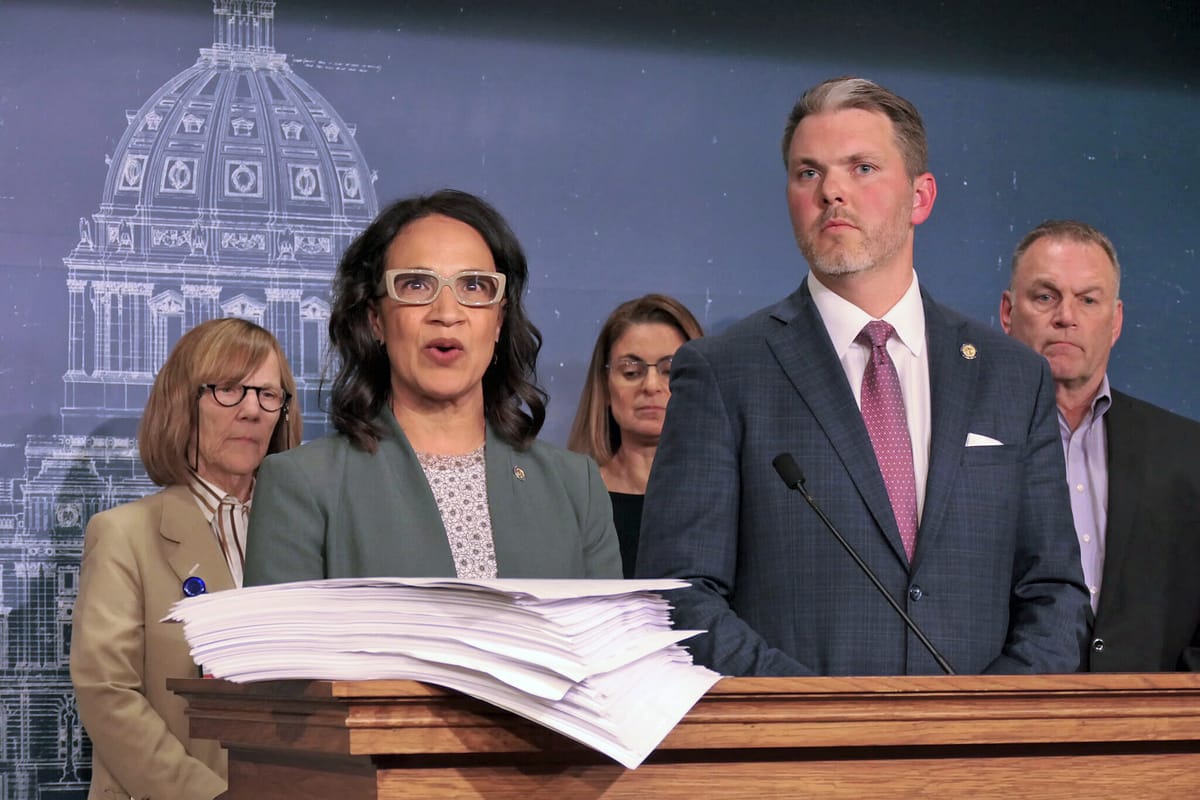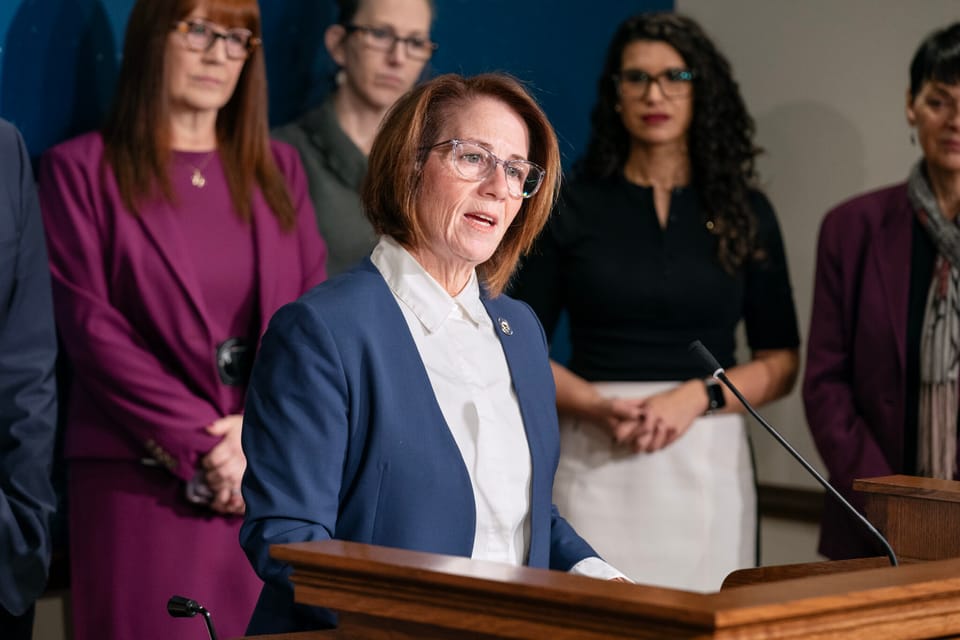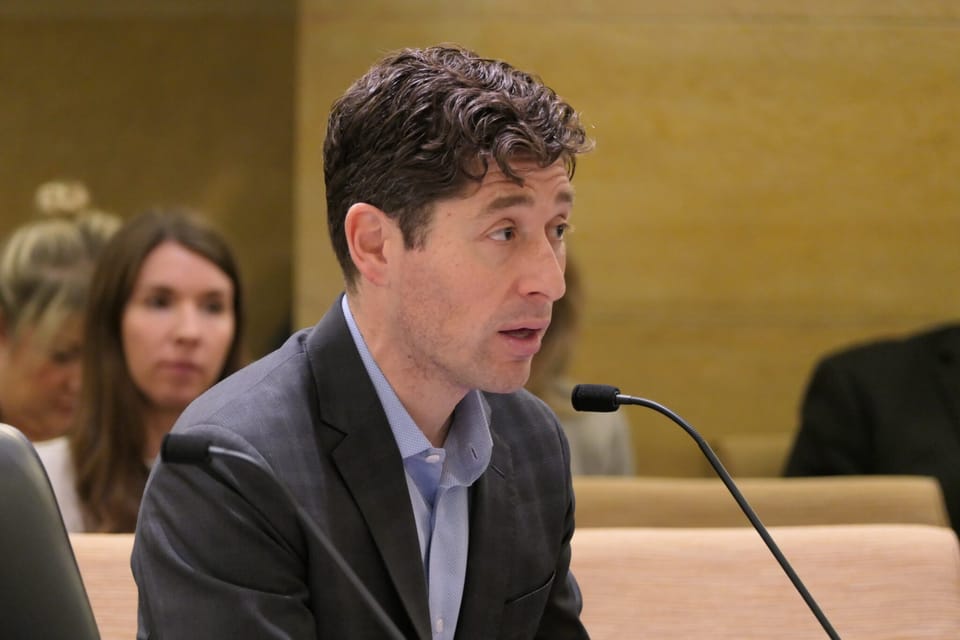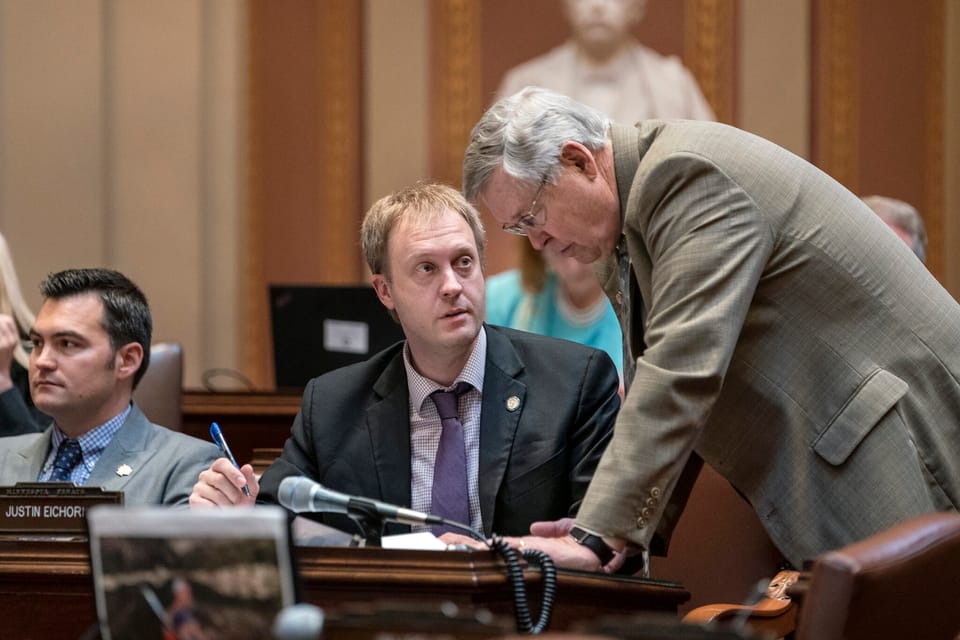Chaotic end leaves Democratic Legislature with a few wins

By Michelle Griffith
Democratic lawmakers in the final hour of the 2024 legislative session passed a 1,400 page bill that includes a lengthy list of policy items, from minimum pay rates for Uber and Lyft drivers to increased penalties for straw gun purchases and changes to the state’s paid leave law that will result in a higher payroll tax.
Republicans cried foul, shouting at the rostrum in both the House and Senate as the clock ticked toward the midnight deadline.
For 30 minutes they shouted “Shame!” and “Follow the rules!” as Democrats — nursing a one-vote majority in the Senate — shut down debate and forced a vote on the bill while ignoring Republican yelling.
Even with the legislative hijinks, Democrats failed to take action on some key items: They’d hoped to place the Equal Rights Amendment to the state constitution on the 2026 ballot, while supporters of legalized sports betting again went home disappointed, as Minnesota will remain one of the few states in the Midwest without it.
Democrats ended the session without achieving their signature goal: A roughly $900 million infrastructure bill, which required a supermajority — i.e., Republican votes — because it would be financed with borrowed money. Unable to win Republican support, lawmakers will head home without new funding for water treatment plants, roads, bridges, university buildings and other public works projects.
In the final seconds of the session, Senate Democrats attempted to pass a $71 million all-cash infrastructure bill that would not require Republican votes, but failed to finish voting by 12 a.m.
Especially in light of the failure to pass an infrastructure bill — known around the Capitol as the bonding bill and typically passed in the even years — the session will be mostly known for inaction on major issues, even considering the Democrats’ modest goals following the legislative frenzy of 2023.
In the early morning hours on Monday, Democrats blamed the chaotic end and failure to pass an infrastructure package on Republicans, claiming the GOP spent the final few days of session filibustering.
“Certainly, we could have done things earlier this session, but I think that the unprecedented filibusters by the Republicans were the primary cause of what happened today,” House Speaker Melissa Hortman, DFL-Brooklyn Park, told reporters during an early morning news conference.
Republicans said Democrats have no one to blame but themselves.
House Minority Leader Lisa Demuth and Senate Minority Leader Mark Johnson spoke at a press conference shortly after the legislative session ended on May 20, 2024. The GOP leaders denounced the 1,400 page omnibus bill, which they displayed on the podium and was passed by the Democratic majority in the closing moments of the 2024 legislative session. Photo by Michelle Griffith/Minnesota. Reformer.
“The full Democratic majority in the state of Minnesota has had two full years to get their work done … If these were priorities to them, they would have had their work done already and that was not the case,” said House Minority Leader Lisa Demuth, R-Cold Spring. “It’s been a very, very frustrating process.”
The rancorous end is likely a preview of the coming election, when voters will select 134 members of the Minnesota House. Although the Senate is not on the ballot, special elections are a strong possibility in two districts and could flip control of the upper chamber: Sen. Kelly Morrison, DFL-Deephaven, is likely headed to Washington to represent the Third Congressional District in Congress, while Sen. Nicole Mitchell, DFL-Woodbury, will face increasing pressure to resign following an April felony burglary charge of her stepmother’s home.
Uber and Lyft drivers get a raise
The bill guaranteeing Uber and Lyft drivers minimum rates is a significant victory for progressives who pushed for it, as well as Gov. Tim Walz and legislative leadership, who feared the companies would make good on a threat to leave the Twin Cities should a far more aggressive Minneapolis ordinance take effect.
The bill delivers minimum driver pay that’s expected to meet or surpass the Minneapolis minimum wage of $15.57 and will preempt the Minneapolis ordinance, which had been set to take effect on July 1. Drivers completed more than 18 million rides in 2022, and had the companies made good on their threat to leave, Minnesotans and visitors to the state would have struggled to find rides to and from the airport, bars and sporting events as well as doctors appointments, drug stores and work shifts.
Even with the consolation of a long-sought deal on Uber and Lyft, the legislative session’s lackluster finish contrasts with 2023, when Democrats passed a robust two-year budget and a raft of progressive policies — surprising many who believed they would be ensnared by intra-party conflict and Republican obstruction.
This year, DFL lawmakers fell victim to their one-vote majority in the upper chamber.
The Senate on Saturday recessed for 11 hours because they were negotiating the Uber and Lyft deal. Sen. Omar Fateh, DFL-Minneapolis, who has championed the cause of some Uber and Lyft drivers for more than a year, leveraged his effective veto to hold up the rest of Democrats’ agenda until a deal on a ride-hail bill was reached. Fateh was absent during a floor vote on Saturday morning, and the Senate was only able to pass one bipartisan bill that increased funding for emergency medical services in greater Minnesota.
With Saturday wasted, Democrats were forced to make a legislative booyah late Sunday.
“There’s always a lot of activity at the end of session, and when a minority is especially obstructive, the majority has no choice but to use these tactics,” Hortman said.
All session long, Democratic leaders, including Walz, attempted to dampen expectations for the 2024 session. It’s a non-budget year — meaning state government could keep running even if lawmakers passed nothing — but Democrats repeatedly talked up the benefits of a statewide infrastructure package.
But last week, perhaps sensing that negotiations were not progressing, Hortman signaled that Minnesota could go without a major bonding bill this year, citing infrastructure packages of years past.
“We did a record-setting bonding bill in 2020, and we did $2.6 billion last year,” Hortman said. “We have done a lot of capital investment.”
The Senate ran out of time to take up major bills — such as the ERA — and had to triage the less controversial bills. Democrats forced a vote on the cannabis policy bill, for instance, but Republicans spent the subsequent hour-and-a-half making motions and using parliamentary delay tactics, eating into the remaining time.
Advocates early Monday called for a special session to take up the ERA bill, but Hortman said that’s unlikely. The ERA struggled to win the unanimous support of Senate Democrats it needed, following sharp opposition by religious groups over abortion provisions and the lack of a religious freedom plank.
Only the governor can call a special session in Minnesota.
Unity for the Timberwolves; a fierce election ahead
Prior to the turbulent end, the Legislature briefly came into cheerful agreement by celebrating the Minnesota Timberwolves game seven win in the NBA playoffs 98-90 on Sunday evening. In the House, members gave a standing ovation.
“That was the best thing to happen all session,” one lobbyist said.
Democrats in the final days also spent some new money to assist various state agencies.
They allocated $30 million in aid for emergency medical services statewide, though EMS advocates had originally asked for $120 million to assist struggling rural ambulance services.
Before the Capitol had even cleared out early Monday, the election campaign for control of the Legislature had begun.
“This has got to be one of the most disgusting ends to a session that I have seen in the 12 years that I have been here,” said Sen. Bill Weber, R-Luverne, during a taxes conference committee meeting. “Never have I seen the mismanagement of a legislative session that I have seen this year.”
Hortman said she had no major worries about the spectacle, while Demuth countered that the tumultuous end illustrates why Minnesota needs new leadership.
“Democrats cannot lead this state. We know that, and that has just been proven. They cannot effectively govern in the state of Minnesota,” she said.
Minnesota Reformer is part of States Newsroom, a nonprofit news network supported by grants and a coalition of donors as a 501c(3) public charity. Minnesota Reformer maintains editorial independence. Contact Editor J. Patrick Coolican for questions: info@minnesotareformer.com. Follow Minnesota Reformer on Facebook and Twitter.



